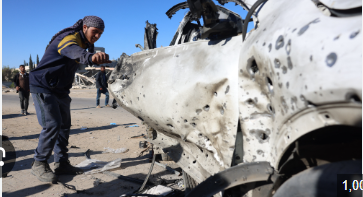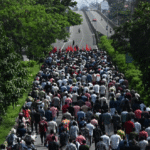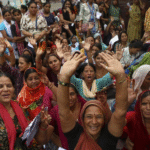1. Introduction: A Region Under Siege
Israeli Strikes conflict in Gaza has reached new levels of intensity as Israeli airstrikes claimed the lives of at least 15 civilians in densely populated areas. Meanwhile, the United Nations Relief and Works Agency for Palestine Refugees in the Near East (UNRWA) faces significant challenges in delivering much-needed aid due to widespread looting. The dual crises of relentless violence and disrupted humanitarian assistance have exacerbated the plight of civilians trapped in the escalating conflict. This article delves into the evolving situation, the factors driving the violence, Israeli Strikes and the far-reaching humanitarian consequences.
2. The Context of Escalation: Renewed Hostilities in Gaza
The latest wave of violence follows weeks of heightened tensions between Israel and Hamas, the militant group controlling Gaza. Rocket fire from Gaza into Israeli territory triggered a robust response from the Israeli Defense Forces (IDF), who launched targeted strikes aimed at disabling Hamas’ military capabilities. However, Israeli Strikes these strikes have resulted in significant collateral damage, including civilian casualties and the destruction of infrastructure.
Gaza, one of the most densely populated regions in the world, has borne the brunt of these hostilities. The region has long been subjected to blockades, limiting the movement of goods and people, which further compounds the humanitarian crisis during periods of heightened violence.
3. Civilian Casualties: The Toll of Airstrikes
Among the 15 killed were women and children, highlighting the indiscriminate nature of urban warfare in Gaza. Residential buildings, markets, and schools have been caught in the crossfire, leaving families devastated. Eyewitnesses described scenes of chaos as buildings crumbled under the impact of airstrikes, trapping people under rubble.
Human rights organizations have condemned the loss of civilian life, calling for an immediate cessation of hostilities. The Israeli government, however, maintains that their strikes target Hamas operatives and weapons storage facilities, claiming that Hamas uses civilian areas as shields, complicating military operations.
4. The Humanitarian Crisis: UNRWA Struggles to Deliver Aid
The humanitarian situation in Gaza, already precarious due to years of conflict and blockade, has worsened. UNRWA, the primary organization responsible for aiding Palestinian refugees, has reported severe disruptions in its operations. Widespread looting of warehouses and aid facilities has left critical supplies inaccessible to those in need. Food, medicine, and shelter materials meant for displaced families have been stolen, Israeli Strikes creating a dire situation for hundreds of thousands of people relying on aid.
UNRWA spokespersons have called for calm and respect for humanitarian operations, emphasizing that the looting undermines efforts to alleviate the suffering of Gaza’s residents. The agency also faces funding shortages, Israeli Strikes limiting its capacity to replenish stolen supplies.  For the more information click on this link
For the more information click on this link
5. Challenges to Humanitarian Assistance
Several factors contribute to the difficulties in delivering aid to Gaza:
- Security Risks: Continuous airstrikes and ground clashes make it perilous for aid workers to operate in affected areas.
- Blockades: Israel’s blockade of Gaza hampers the entry of essential supplies, Israeli Strikes including medical equipment, food, and construction materials.
- Internal Instability: Factional disputes within Gaza, Israeli Strikes coupled with lawlessness in some areas, have exacerbated the challenges for aid organizations.
These barriers highlight the need for international intervention to ensure the safe and effective delivery of humanitarian aid.
6. Regional and International Reactions
The escalating conflict has drawn widespread condemnation and calls for de-escalation from the international community. The United Nations and several world leaders have urged both sides to exercise restraint and prioritize the safety of civilians. Protests have erupted in cities worldwide, Israeli Strikes expressing solidarity with Gaza’s residents and calling for an end to the violence.
Despite these calls, efforts to broker a ceasefire have yet to yield results. The United States, a key ally of Israel, has expressed support for Israel’s right to self-defense but has also urged caution to prevent further civilian casualties. Meanwhile, Israeli Strikes countries in the Middle East, including Egypt and Qatar, Israeli Strikes have offered to mediate in the crisis.
7. The Role of Hamas: A Divisive Force
Hamas’ actions, including launching rockets into Israel, have drawn criticism for provoking Israeli retaliation. While Hamas frames its operations as resistance against Israeli occupation, Israeli Strikes its tactics often place Gaza’s civilian population at risk. Critics argue that Hamas’ use of densely populated areas as launch sites for attacks invites devastating responses from the Israeli military.
On the other hand, many in Gaza view Hamas as a symbol of resistance against years of Israeli occupation and blockade, complicating efforts to address the root causes of the conflict.
8. Voices from the Ground: Stories of Survival and Loss
Civilians in Gaza have shared harrowing accounts of survival. Families describe fleeing their homes under the cover of darkness, seeking refuge in overcrowded shelters that offer little protection from airstrikes. Hospitals, already strained due to limited resources, are overwhelmed with casualties, forcing medical staff to work under dire conditions.
One resident, whose home was destroyed in the strikes, lamented, “We have nowhere to go. Every place is a target, and every day is a struggle to survive.” Such stories underscore the urgent need for a humanitarian ceasefire and international assistance.
9. The Broader Implications: Regional Stability at Risk
The Gaza conflict has repercussions beyond its borders. The violence threatens to destabilize the broader Middle East, where tensions between Israel and neighboring countries like Lebanon and Syria remain high. Spillover effects could escalate into a wider regional conflict, Israeli Strikes further complicating diplomatic efforts to address longstanding disputes in the region.
Moreover, the humanitarian crisis in Gaza could lead to increased displacement, Israeli Strikes with thousands seeking refuge in neighboring countries already grappling with their own challenges.
10. Calls for Accountability and Long-term Solutions
As the situation in Gaza deteriorates, Israeli Strikes there is a growing demand for accountability and sustainable solutions. Human rights organizations have called for independent investigations into alleged violations of international law by both Israeli forces and Hamas. They emphasize the need to protect civilians and hold perpetrators of violence accountable.  For the more information click on this link
For the more information click on this link
Long-term peace in the region requires addressing the root causes of the conflict, Israeli Strikes including the Israeli occupation, the blockade of Gaza, and the broader Israeli-Palestinian dispute. Without meaningful progress on these issues, cycles of violence are likely to persist.
11. The Way Forward: Bridging Divides
The immediate priority is to secure a ceasefire that allows for the safe delivery of humanitarian aid and the protection of civilians. International actors, Israeli Strikes including the United Nations, the United States, and regional powers, must play a proactive role in mediating between the parties and ensuring compliance with international law.
In the long term, rebuilding trust between Israelis and Palestinians is essential. This requires dialogue, compromise, and a commitment to a two-state solution that addresses the aspirations of both sides for security, Israeli Strikes sovereignty, and peace.
12. Conclusion: Hope Amidst Despair
The tragedy unfolding in Gaza is a stark reminder of the human cost of conflict. The loss of innocent lives, the destruction of homes, and the disruption of humanitarian aid highlight the urgent need for international solidarity and action. As the world watches, Israeli Strikes the hope for peace remains fragile but essential.
Through diplomacy, accountability, Israeli Strikes and a renewed focus on addressing the root causes of the conflict, there is still a chance to end the suffering and pave the way for a brighter future for the people of Gaza and the region. ALSO READ:- Israeli Military Strikes Kill 32 Palestinians Across Gaza: Escalating Tensions in the Middle East 2024




